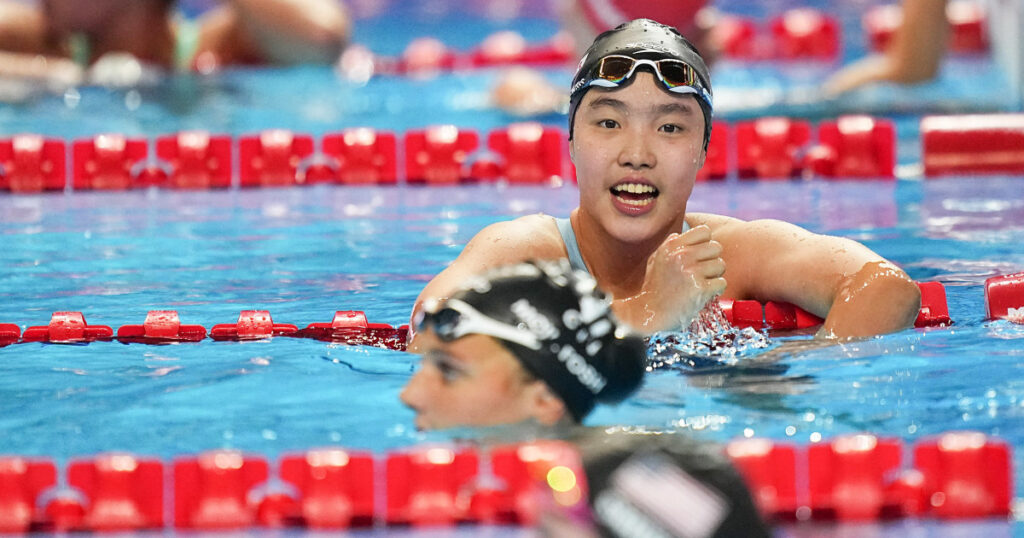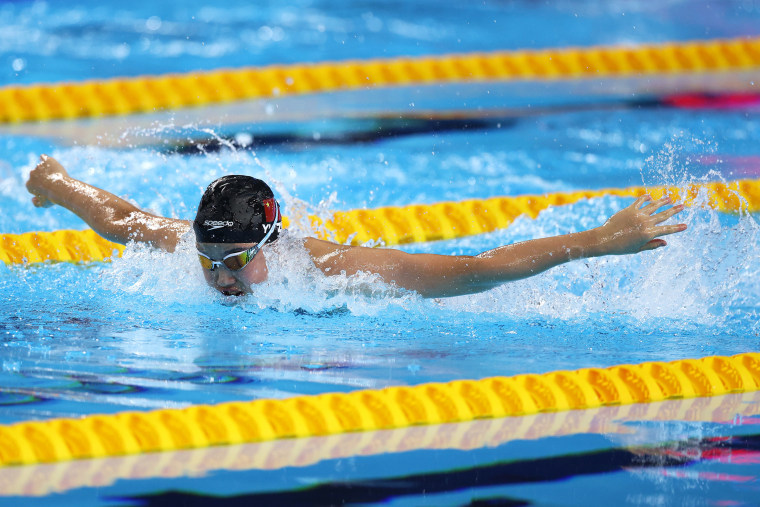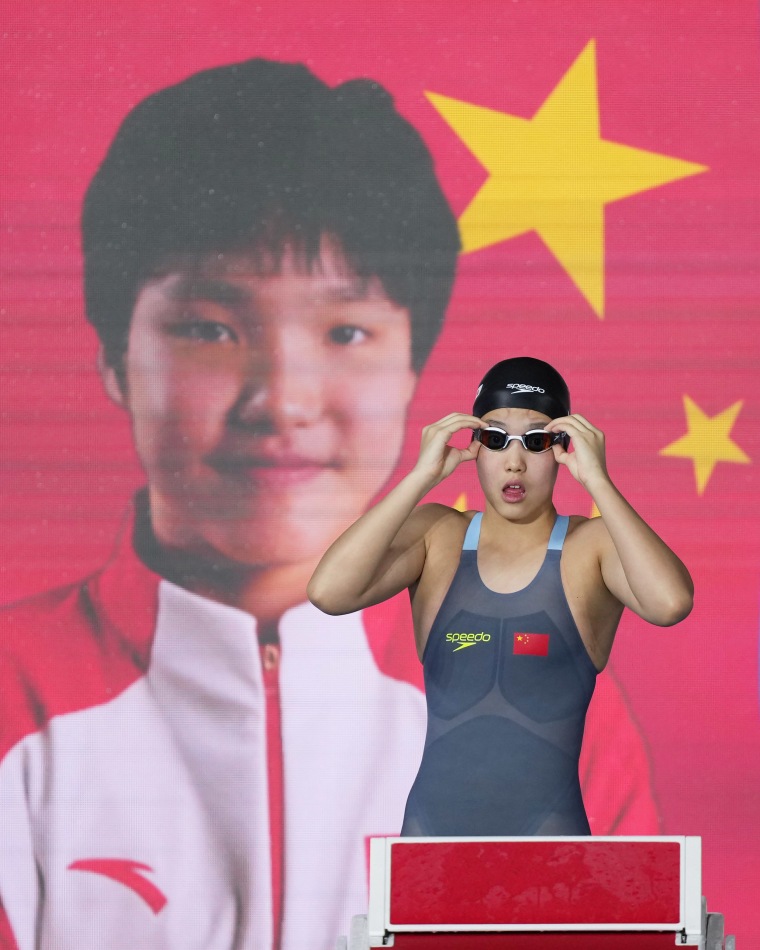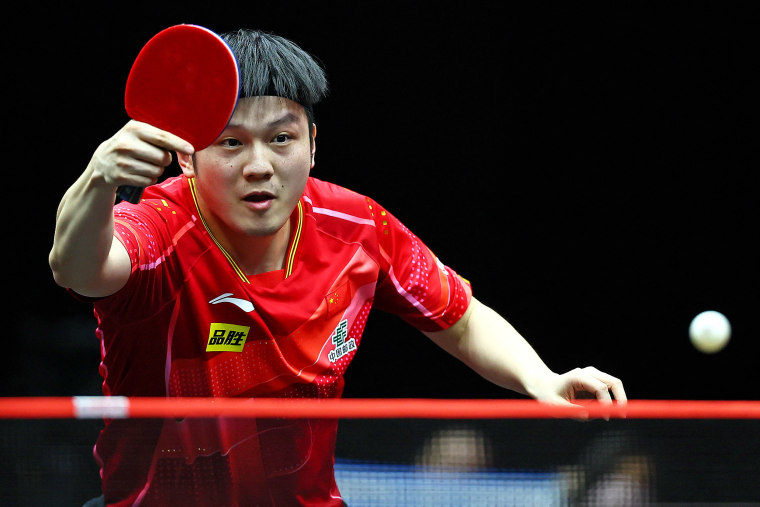
HONG KONG — A 12-year-old Chinese swimmer has become a global sensation with her history-making times, even as observers and fans back home caution against overhyping the young athlete.
On Thursday, Yu Zidi became the youngest-ever medalist at the World Aquatics Championships, which are being held in Singapore this year.
Yu was part of the Chinese team that took bronze in the women’s 4×200-meter freestyle relay, with the United States winning silver and Australia winning gold. Though she did not compete in the final, she received a medal because she swam in the qualifying race.
“I was really excited to join the relay. It felt great,” Yu told reporters Thursday. “The World Championships are fun, and I hope to swim faster.”

The Chinese prodigy began swimming around age 6 just to beat the heat in her home province of Hebei. She said she never thought about becoming a professional athlete until a coach approached her at a swimming pool one day.
“At the time, I thought: why not give training a try?” Yu told Xinhua, China’s state-run news agency, in May.
Yu, who is also the youngest person to medal at a major international competition since 1936, could earn an individual medal on Sunday in the women’s 400-meter medley. Her times are so fast that they allowed her to compete at the World Aquatics Championships even though the minimum age requirement is usually 14.
She has already come close to medaling in two other events in Singapore, missing the podium by 0.06 seconds in the women’s 200-meter medley on Monday and 0.31 seconds in the women’s 200-meter butterfly on Thursday.
At the Chinese national championships in May, Yu finished the 200-meter individual medley with a time of 2:10.63, winning a silver medal and setting a world record in the event for any 12-year-old, male or female.
Hailed as the world’s greatest swimmer her age, Yu has been compared to phenoms such as Katie Ledecky of the United States and Summer McIntosh of Canada, with times that would have put her on the verge of medaling at the 2024 Paris Olympics. Already, Yu is swimming the 400-meter individual medley about 15 seconds faster than McIntosh was at the same age.

Her stunning performance before she’s even a teenager has many wondering how she might shape competitive swimming in the years to come.
But some Chinese sports fans and commentators have urged the public not to overhype the preteen rising star.
Yu’s sudden fame may expose her to “disproportionate” pressure that could keep her from achieving her full potential, the state-backed digital news outlet Shanghai Observer said in an editorial Thursday.
“We must let this 12-year-old grow her splash slowly into a wave,” it said, adding that there is “no need to rush into hero worship.”
The warning hinted at a shift in how China promotes its elite athletes in the wake of persistent doping allegations and what has been criticized as a “toxic” fan culture.
Success at the highest levels of sport has been central to China’s construction of national identity, with the government focused on dominating medal tables at the Olympics and other events.
But the push for gold medals also puts a lot of stress on the countries’ star athletes, as does the intensity of public scrutiny.
Organized sports fandom first emerged around 2016 when Chinese social media users, jaded by sex scandals that had tarnished the wholesome image of pop stars they previously adored, began following Olympic athletes instead, said Zhang Bin, a veteran sports commentator in China.
The new fans brought “sophisticated strategies” from the entertainment industry, setting off “fandom wars” among different groups that tried to outdo each other in supporting their athletes, Zhang said.
China’s extreme sports fan culture, which can include fan mobs, cyberbullying of athletes and heckling behavior at sports events, was especially visible around the Paris Olympics last year.
When gold-medal-winning diver Quan Hongchan returned to her hometown, visitors flocked to her home for days. Some livestreamed with their phones while others flew drones, and travel agencies even started offering tours of her village.
Pan Zhanle, an Olympic champion swimmer, was praised for disbanding his official fan group after his success at the Paris Games overwhelmed him with a surge of new followers.
The Chinese government has been cracking down, with its cyberspace watchdog saying in April that it had shut down over 3,700 social media accounts with illegal or noncompliant content aimed at Chinese athletes.

But sometimes the frenzy goes beyond the internet. Chinese table tennis player Fan Zhendong, an Olympic gold medalist, said he was traumatized when a stranger sneaked into his hotel room in 2023.
“I never thought, as an athlete, I would have to go through something like this,” he told Phoenix TV last week, adding that organized online abuse had caused him “severe” mental stress that contributed to several unexpected losses.
Since sports prodigies naturally attract followers, fan groups could also be a concern for Yu in the future, said Zhang, who was at the World Aquatics Championships in Singapore.
China is often overprotective of its athletes, but it “may not be a good thing if Yu is living in isolation like protected giant pandas,” he said.
“For athletes, learning to interact with the media is a necessary part of their development,” Zhang added.
Jessie Zhou, 23, a graduate student in Hong Kong who closely follows table tennis star Fan, said it was a “good call” for Chinese media to cover Yu in a “restrained tone” while extreme sports fandom remains unresolved.
“Just let the kid stay focused on training,” Zhou said.
 Latest World Breaking News Online News Portal
Latest World Breaking News Online News Portal






